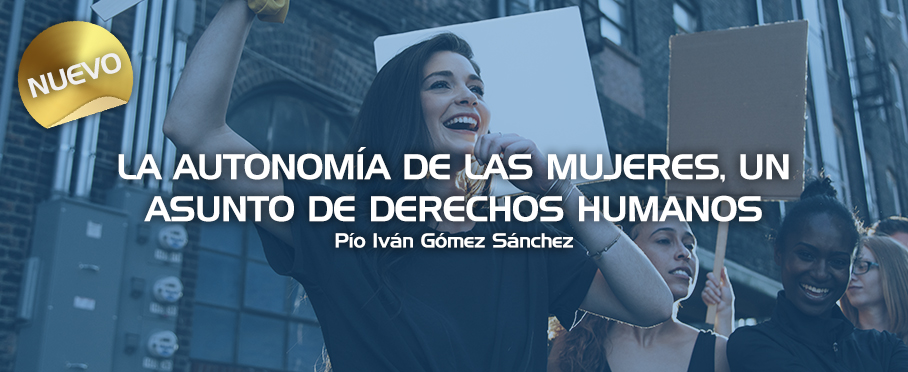AUTONOMY OF WOMEN AN ISSUE OF HUMAN RIGHTS
– PÍO IVÁN GÓMEZ SÁNCHEZ MD, MSC, FACOG FULL
PROFESSOR NATIONAL UNIVERSITY OF COLOMBIA
SENIOR MEDICAL ADVISOR IPPF/WHR
Our region, in which more than 20 million women have unmet demand for contraception, has some of the most restrictive abortion laws in the world and 95% of abortions are unsafe, leading to maternal morbidity and mortality. Research has shown that countries without barriers to contraception, sex education, and legal access to abortion have substantially reduced maternal and infant mortality rates and have the lowest rate of induced abortions.
Those of us who have been working in Sexual and Reproductive Health for several years have attended innumerable congresses, forums, committees, etc., aimed at reducing maternal mortality and today, if we contrast with the reality of the moment, we are overwhelmed by a feeling of impotence, we are anguished inequity, negligence and social injustice and it is when the words of the former president of the International Federation of Obstetrics and Gynecology (FIGO) Professor Mahmould Fathalla become more valid: “Women are not dying from causes that we cannot avoid… they are dying due to that society considers that their lives are not worth the price of saving them”.
Maternal mortality is just the visible tip of a large iceberg that represents a much more complex problem. As health professionals it has taken us a long time to understand this phenomenon within a broader context of human rights and social change. We are committed to fighting unjust and unequal attitudes about the value of human lives, particularly the lives of women. It is a fight in which women are the victims but they can also be protagonists to make the change.
Now we better understand the issue of maternal morbidity and mortality in this more global context and we have understood that we are part of a broader struggle, which needs new perspectives for problems that have plagued us for a long time, such as maternal mortality. As health professionals we endorse international recommendations and understand health as a social right which is expressed in the various obligations that States must comply with in accordance with the international conventions, protocols and declarations they have signed. The current approach to health is based on human rights, recognizing that people are holders of rights, which implies that there are other people obliged to ensure their validity: governments must be guarantors of rights,
The sexual rights and reproductive rights of people are based on the Universal Declaration of Human Rights of 1948, the ownership of these rights indicates that every person has natural rights that must be recognized, respected and guaranteed by governments in a mandatory manner. In the international sphere, the various agreements reached on human rights have a higher hierarchy than national legislation. What is established in international law becomes an obligation of the States with the citizenry and it is a duty of the countries to guarantee its effective compliance.
The World Health Organization proposed the concepts of Sexual and Reproductive Health, which were approved at the International Conference on Population and Development, Cairo, 1994 and ratified at the Fourth World Conference on Women, Beijing, 1995. The concept of Sexual and Reproductive Health is focused on people, men and women, as active subjects in the exercise of their sexual and reproductive rights, participating in the achievement of a better quality of personal life, of their partners, of their family and society in general.
Maternal, neonatal and child health are highly relevant issues for societies and constitute the center of the right to health. For more than a century, health policies in the world have privileged safe motherhood and child survival.
Maternal health is currently considered a human right and maternal deaths a serious violation of women’s human rights. In this context, it is the obligation of governments to protect women’s rights to life, health and equality.
Due to the above, it is incomprehensible that in the XXI century there is a debate about whether or not women can legally interrupt a pregnancy. Unfortunately sometimes it focuses only on abortion on the false dichotomy of “pro-life” (anti-rights) versus “pro-choice” (pro-rights). Nobody is against life, all of us are in favor of life, but of a dignified life, with quality and with the possibility of making choices.
We are born with a series of rights that the State does not grant us, but has to recognize them, constituting these rights in limits to the exercise of political power.
With unfinished work on the Millennium Development Goals, we are now embarking on Sustainable Development, whose concept was defined in 1988 by the World Commission on Environment and Development as: development that meets the needs of the present generation without compromising the ability of future generations to meet their own needs.
The Post-2015 Development Agenda sets out 17 Sustainable Development Goals. The fifth is to achieve gender equality and the empowerment of all women and girls, and thus guarantee universal access to sexual and reproductive health within a framework of sexual rights and reproductive rights in accordance with the Program of Action of the International Conference on Population and Development, the Beijing Platform for Action and the outcome documents of its follow-up conferences.
Monique Witting wrote: “Women, although extremely visible as sexual beings, remain invisible as social beings”, it is time for our society to become aware of the rights and autonomy of women to decide on their bodies, to be a reality in all our countries without any exception”.





